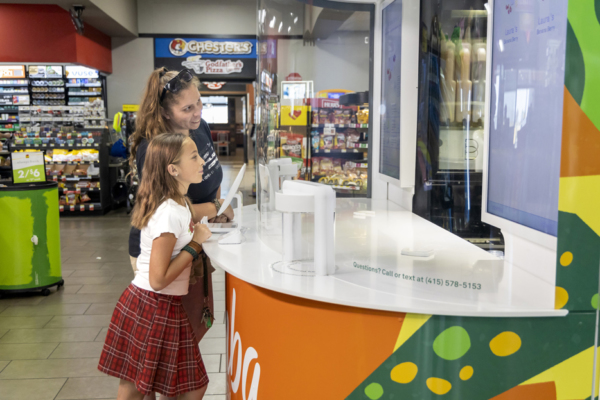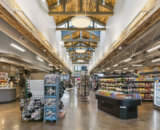Article created for the July digital issue of
Automation and digitization are changing nearly every industry, including truckstops, travel plazas and convenience stores. New technology is helping companies automate tasks and re-direct labor to responsibilities that directly benefit customers.
“You want to automate tasks that are dirty, dull or dangerous,” said Kris Dihrkop, director of strategic accounts, North America, ICE Cobotics, which offers floor-scrubbing robots.
// For more on topic, this October at NATSO’s FastForward EY-Parthenon is presenting on Macro Trends Analysis: Automation, Artificial Intelligence, and the Implications for Labor. Learn more about NATSO’s FastForward here. //
Keeping Things Clean
Cleaning can fall into that category, Dihrkop said, which is why several major brands, including Kum & Go and Phillips 66, have rolled out ICE Cobotics’ Cobi 18. “Customers have high expectations of food, service and cleanliness. In many cases, locations can’t hire people, so they’re leaning on technology,” Dihrkop said.
Marty Roush, vice president of operations at Kum & Go, said Kum & Go’s continuous improvement culture drives the company to find equipment and process improvements that make it easier for store associates to execute. “We are excited to participate in the development of the Cobi 18 to support stores during times of staffing challenges,” he said. “Our associates and customers think Cobi is fun, which means it gets used more than any scrubber we have utilized in our stores to date.”
Dihrkop said Cobi 18 could boost employee morale. “Employees love it. They would rather fill up Cobi’s tank, set it up and clean it out than use the mop and bucket,” he said.
Setting up Cobi 18 is similar to setting up a manual scrubber. “You fill the tank and dump it out when it is empty,” Dihrkop said, adding that the brushes and squeegees used on the robot are magnetic, so employees don’t need any tools to remove and clean them. “It takes about 10-15 minutes.”
Cobi 18 can clean 5,000 square feet per hour and is designed to work around customers. However, to get the maximum amount of productivity, it is best to run it when there are fewer obstructions. “You can run it during times of day that yield better results,” Dihrkop said.
However, some customers like interacting with the robots, which can become a draw. “When you put one of these in your store, you will get attention. People will take videos and stuff will show up on social media,” Dihrkop said, adding that he knows of one grandmother who takes her grandson to a location to get a treat and say ‘hi’ to Cobi.
The cost of robots has continued to drop, and ICE Cobotics has created a robot-as-a-service model, so customers don’t have to make a large capital investment. There is a fixed cost, and customers can pay annually or monthly. “If you break it down to what Cobi would cost on a daily basis, it is about $17 a day. If you’re spending more on that with labor it probably makes sense,” Dihrkop said.
He added that the amount of data from the robots is an added benefit. “You can monitor a fleet of Cobi’s from your fleet app. You can see how frequently they’re using machines, how long they are using them and which machines aren’t being used,” Dihrkop said.
Providing Entertainment, Customization and Choice
New technology is also streamlining food preparation, increasing self-serv options and expanding offerings in the food-service space.
Love’s has opened a Jamba by Blended autonomous robotic kiosk at its location in William’s, California. The self-operating kiosk will be open 24/7 and customers can customize their smoothie orders by adjusting ingredient quantities or adding boosts directly through the Blendid app. Plus, they can order on-site or schedule a preferred pick-up time in advance.
Joe Cotton, vice president of food services for Love's, said the kiosk is a “fun new way” for customers to access smoothies on the go.
Danielle Fisher, vice president of marketing for Jamba, said the kiosk also provides a new experience for customers. "We began to notice that our guests were really interested in the robots, and created personas for them, as they watched them make smoothies and, yes, even dance," she said.
More and more unique food offerings are available via kiosks across the quick-serv space. Automated Retail Technologies’ Just Baked hot food kiosk offers bagel sandwiches, White Castle sliders, pizza, calzone, potstickers, cinnamon rolls, brownies and more. The kiosks are 48″ wide X 39″ deep X 76″ tall and are ADA compliant and NAMA Certified.
Just Baked partnered with Wow Bao, a fast-casual food concept. Wow Bao has opened 50 kiosks in 24 cities through a partnership with Automated Retail Technologies and its Just Baked Hot Food kiosks. Initially located in hospitals, hotels, bars, schools, airports and casinos, the vending machines offer Teriyaki Bao, Mongolian Beef Bao, Chicken Dumplings and Coconut Custard Bao steam buns.
RoboBurger offers the world's first fully autonomous robotic burger chef in a box, that grills, toasts, adds condiments and assembles a fresh burger, in less than five minutes. RoboBurger Inc. launched its first pop-up location last year in Newport Mall in Jersey City.
"Since opening our first pop-up location, we've gotten a lot of feedback that has helped us improve both the taste of our burgers and the time it takes to make them. Our newest units reflect these changes and customers can now get a hot, freshly grilled burger in about four minutes,” said Dan Braido, chief technology officer of RoboBurger Inc.
Automating Kitchen Prep
Many food service operations are focused on maximizing labor and minimizing waste; technology can also help there.
The Picnic Pizza Station automates pizza prep, which saves time, money and labor. The Picnic Pizza Station is autonomous and entirely customizable for each order. After loading the dough, the Picnic station applies the sauce, cheese, freshly cut meat, and additional toppings. The finished pizzas are then loaded into the store's ovens for cooking. The Picnic station can assemble up to 100 pizzas an hour with one operator.
Miso Robotics has pioneered several kitchen technologies, including Flippy 2, Sippy and Chippy. Flippy 2 is engineered to fry nearly anything, the company reported. Food prep is two times faster and there is 30% more fried food throughput.
Jack in the Box is among the companies testing Flippy 2 and Sippy, which automatically pours and seals drinks. “This collaboration with Miso Robotics is a stepping stone for our back-of-house restaurant operations. We are confident that this technology will be a good fit to support our growing business needs with intentions of having a positive impact on our operations while promoting safety and comfort to our team members,” said Tony Darden, chief operating officer at Jack in the Box.
Chipotle is testing Chippy, which automatically makes tortilla chips. “We are always exploring opportunities to enhance our employee and guest experience. Our goal is to drive efficiencies through collaborative robotics that will enable Chipotle’s crew members to focus on other tasks in the restaurant,” said Curt Garner, chief technology officer, Chipotle.
Chippy can even be programmed to perform more human-like. “Everyone loves finding a chip with a little more salt or an extra hint of lime,” said Nevielle Panthaky, vice president of Culinary, Chipotle. “To ensure we didn’t lose the humanity behind our culinary experience, we trained Chippy extensively to ensure the output mirrored our current product, delivering some subtle variations in flavor that our guests expect.”
Bringing Vending Machines to Customers
Automation is coming to more traditional vending options as well. Tortoise, a Silicon Valley startup, has launched smart stores that can deliver products to customers. Walmart is testing Tortoise’s robotic delivery vending machine to deliver snacks, such as beef jerky, to shoppers waiting for curbside pickup orders in a parking lot area. The Tortoise robots drive up to the shopper's vehicle and once the shopper pays with a credit card, the robot's lid opens to let them get their item.
Technology delivering products to waiting consumers could be especially useful as electric vehicle adoption and charging ramps up and drivers wait in their vehicles as they charge.
Looking Ahead
NATSO is committed to bringing new, innovative ideas to its members and is working with several technology providers to bring solutions to NATSO Connect 2024, February 18-22, 2024, at Disney's Yacht Club Resort in Orlando.
// This article was created for Stop Watch magazine, the magazine of the NATSO Foundation. The NATSO Foundation is the research, education and public outreach subsidiary of NATSO, Inc. The NATSO Foundation provides programs and products to strengthen travel plazas’ ability to meet the traveling public's needs through improved operational performance and business planning. Visit www.natsofoundation.org for more information. (Donate to the NATSO Foundation here.)
Subscribe to Updates
NATSO provides a breadth of information created to strengthen travel plazas’ ability to meet the needs of the travelling public in an age of disruption. This includes knowledge filled blog posts, articles and publications. If you would like to receive a digest of blog post and articles directly in your inbox, please provide your name, email and the frequency of the updates you want to receive the email digest.




